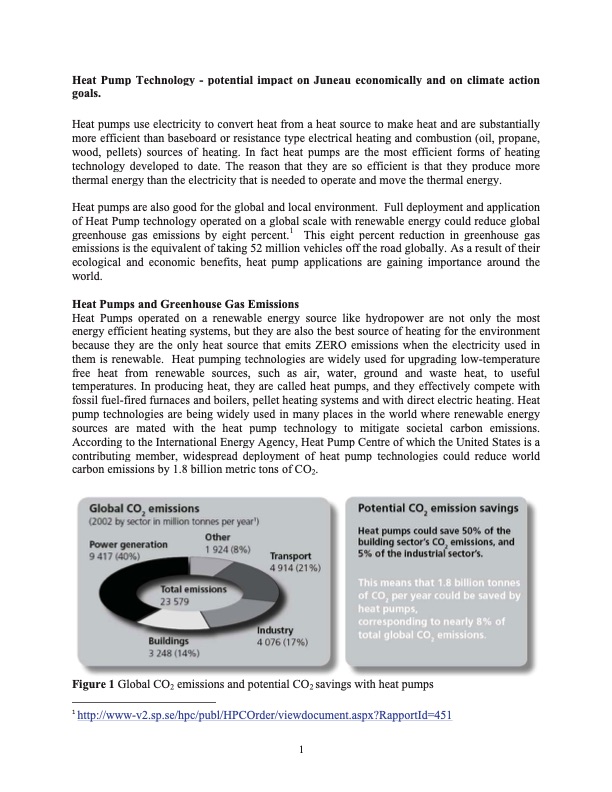
PDF Publication Title:
Text from PDF Page: 001
Heat Pump Technology - potential impact on Juneau economically and on climate action goals. Heat pumps use electricity to convert heat from a heat source to make heat and are substantially more efficient than baseboard or resistance type electrical heating and combustion (oil, propane, wood, pellets) sources of heating. In fact heat pumps are the most efficient forms of heating technology developed to date. The reason that they are so efficient is that they produce more thermal energy than the electricity that is needed to operate and move the thermal energy. Heat pumps are also good for the global and local environment. Full deployment and application of Heat Pump technology operated on a global scale with renewable energy could reduce global greenhouse gas emissions by eight percent.1 This eight percent reduction in greenhouse gas emissions is the equivalent of taking 52 million vehicles off the road globally. As a result of their ecological and economic benefits, heat pump applications are gaining importance around the world. Heat Pumps and Greenhouse Gas Emissions Heat Pumps operated on a renewable energy source like hydropower are not only the most energy efficient heating systems, but they are also the best source of heating for the environment because they are the only heat source that emits ZERO emissions when the electricity used in them is renewable. Heat pumping technologies are widely used for upgrading low-temperature free heat from renewable sources, such as air, water, ground and waste heat, to useful temperatures. In producing heat, they are called heat pumps, and they effectively compete with fossil fuel-fired furnaces and boilers, pellet heating systems and with direct electric heating. Heat pump technologies are being widely used in many places in the world where renewable energy sources are mated with the heat pump technology to mitigate societal carbon emissions. According to the International Energy Agency, Heat Pump Centre of which the United States is a contributing member, widespread deployment of heat pump technologies could reduce world carbon emissions by 1.8 billion metric tons of CO2. Figure 1 Global CO2 emissions and potential CO2 savings with heat pumps � http://www-v2.sp.se/hpc/publ/HPCOrder/viewdocument.aspx?RapportId=451 1PDF Image | Heat Pump Technology

PDF Search Title:
Heat Pump TechnologyOriginal File Name Searched:
jcos_heat_pump_technology.pdfDIY PDF Search: Google It | Yahoo | Bing
CO2 Organic Rankine Cycle Experimenter Platform The supercritical CO2 phase change system is both a heat pump and organic rankine cycle which can be used for those purposes and as a supercritical extractor for advanced subcritical and supercritical extraction technology. Uses include producing nanoparticles, precious metal CO2 extraction, lithium battery recycling, and other applications... More Info
Heat Pumps CO2 ORC Heat Pump System Platform More Info
| CONTACT TEL: 608-238-6001 Email: greg@infinityturbine.com | RSS | AMP |